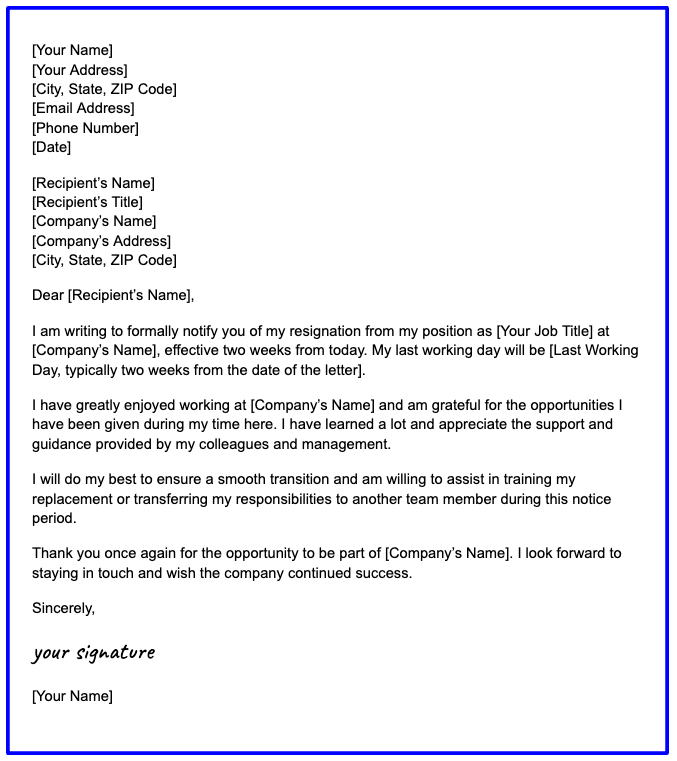A 2 week notice letter is a formal document informing your employer of your intention to leave your current position in two weeks. This period gives your employer enough time to plan for your departure and start the process of finding your replacement. Submitting a well-written letter ensures you leave on good terms, maintaining professionalism and preserving your reputation.
Table of Contents
Basic Format of a 2 Week Notice Letter
The structure of a 2 week notice letter is simple and straightforward. It should be clear, concise, and formal. Here’s the basic format to follow:
- Header: Include your contact information, the date, and the recipient’s contact information.
- Salutation: Address the letter to your immediate supervisor or the appropriate manager.
- Opening Paragraph: Clearly state your intention to resign and mention your last working day.
- Body: Offer assistance during the transition period and express gratitude for the opportunity.
- Closing: End with a formal closing, your signature, and printed name.
Here’s an example of a 2 week notice letter:

Essential Information to Include
When writing your 2 week notice letter, it’s important to know what to include. Begin by clearly stating that you are resigning from your position. For example, you might write, “I am writing to formally resign from my position as [Your Job Title] at [Company Name].” Next, specify the last date you will be working, which is typically two weeks from the date of the letter. You can phrase this as, “My last day of work will be [Date].”
Offer to assist with the transition to ensure a smooth handover of your responsibilities. This can include training your replacement or completing any outstanding tasks to minimize disruption. For instance, you could say, “I am willing to help train my replacement or assist with any necessary tasks during this transition period.”
Finally, express your gratitude for the opportunities and experiences you have gained while working at the company. A simple but sincere sentence like, “I am grateful for the opportunities I have had at [Company Name],” can leave a positive impression and help maintain a good relationship with your employer. Including these elements in your 2 week notice letter will help ensure that you resign on good terms and maintain your professionalism.
Tone and Professionalism Matter
Maintaining a professional and respectful tone is crucial when writing your 2 week notice letter. This approach helps ensure that you leave your current job on good terms. To achieve this, focus on the positive experiences and growth opportunities you’ve had in the company. Highlighting these aspects demonstrates your appreciation for the role and the organization. Additionally, use a formal writing style, avoiding informal language or slang, which helps convey your seriousness and professionalism.

Keep the letter brief and to the point, avoiding unnecessary details or complaints that could detract from the main message. Even if you are unhappy with your current job or leaving due to negative experiences, it’s important to maintain a respectful tone throughout the letter. Avoid negative comments or criticisms of the company, your supervisor, or colleagues. This shows maturity and can leave a lasting positive impression on your employer. Leaving on good terms helps you keep the connections you’ve made, which can lead to helpful references, networking opportunities, and future career options.
Customizing for Different Situations
Depending on your specific situation, you might need to personalize your 2 week notice letter. Below are some situations and tips on how to adapt your letter accordingly:
- Leaving for a New Job: If you are leaving for a new opportunity, you might mention your excitement about the new role while still expressing gratitude for your current position.
- Relocation: If you are moving to a new location, explain this briefly and express regret for having to leave the company.
- Pursuing Further Education: Mention your educational goals and how they will help you in your career, while thanking the company for their support.
- Personal Reasons: If you are resigning due to personal reasons, it is usually sufficient to state that you have personal matters that require your full attention, without going into detail.
Each scenario may slightly change the tone or content of your letter, but the basic structure should remain the same.
Delivering Your 2 Week Notice and What to Expect
How you deliver your notice is almost as important as the content of the letter itself. According to the Harvard Business Review, you should always inform your manager first, and avoid talking about leaving with other colleagues until you’ve officially handed in your resignation letter. If possible, hand-deliver your letter in person, as this shows respect and allows for immediate communication. For remote employees, it’s best to schedule a phone call to inform your supervisor of your resignation, followed by an email with your notice attached. If neither of these are feasible, sending the notice via email is acceptable, but make sure to follow up with a hard copy and mail the signed letter to your manager.
Giving your two-week notice letter to your employer, whether in person or by phone call, allows for a discussion about your departure and any transition plans. Express your gratitude and willingness to assist during this time, which will help you maintain a positive relationship with your employer. Keep in mind that your boss may need time to process the news, so they may not be ready to have a detailed discussion about the transition right away, and may want to schedule a subsequent meeting.

After submitting your notice, follow up with your supervisor to discuss your transition plan and ensure all necessary steps are taken to facilitate a smooth handover. You may offer to train the person taking over for your job or write detailed handover notes, documenting key processes and projects to ensure your replacement can pick up where you left off.
When you deliver your 2 week notice letter, be ready to discuss or at least state your reasons for leaving. If your employer presents a counteroffer, you don’t have to answer right away; it’s perfectly fine to ask for some time to think it over. This will give you the opportunity to weigh the benefits of staying against the reasons you initially decided to leave. Taking this time will help you make a well-informed decision about your next steps.
The Real Questions People Are Afraid to Ask
What if my employer asks me to leave immediately?
If your employer asks you to leave immediately, understand that they may have the right to do so, depending on your employment contract and local laws. Ensure you receive any owed compensation and request a written confirmation of your termination date.
Can I retract my 2 week notice letter?
In some cases, you may be able to retract your 2 week notice letter if you change your mind. However, this depends on your employer’s policies and the circumstances of your resignation. Communicate openly with your employer if you wish to stay.
How do I handle negative reactions from colleagues?
Be professional and positive. Focus on the future and the opportunities that await you. Understand that not everyone may react positively to your 2 week notice letter, but maintaining a courteous demeanor will leave a good impression.
Is a 2 week notice letter necessary for all job levels?
While a 2 week notice is a standard courtesy, some higher-level positions may require a longer notice period. Check your employment contract for specific requirements and discuss with your employer if you are unsure.
How should I address resignation in my new job interviews?
Be honest but diplomatic when discussing your resignation in new job interviews. Focus on the positive aspects of your career change, such as seeking new challenges or professional growth opportunities.
What if I’m in a hostile work environment?
If you are in a hostile work environment, prioritize your safety and well-being. Consider speaking with HR or a legal advisor before submitting your notice. In extreme cases, you may need to resign immediately and forgo the 2 week notice.
The Importance of a Respectful Exit
Ultimately, the way you handle your resignation can have a lasting impact on your professional reputation and future career prospects. A thoughtful approach to your 2 week notice letter, respectful communication, and a willingness to assist during the transition period can ensure that you leave your current position on a positive and professional note. This positive departure sets the stage for continued success in your career journey and preserves valuable professional relationships.

